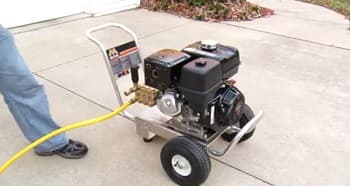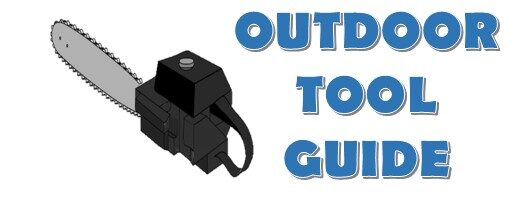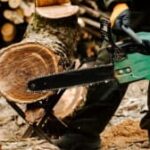As an Amazon Associate, this site earns commissions from qualifying purchases. For more information click here.
A backfire occurs when you hear a loud noise coming from the pressure washer. Because it is so loud and emanates from the engine, should you be worried? A backfiring engine means there is something wrong with the pressure washer and you need to fix it as soon as possible.
A pressure washer backfires and emits a loud sound if the engine is too hot, the carburetor is too lean or the wrong fuel is used. To fix this problem, slowly reduce the throttle speed.
What Causes a Pressure Washer to Backfire?
There are many reasons why pressure washer engines backfire. Knowing the specific cause is a must so you can use the right solution. If you are using a gas powered pressured washer like the WEN PW3200, this info might come in handy.
Engine Timing Not in Sync
The cylinders in a pressure washer engine have valves that allow fuel and air to get in, so it can combust and fire up the engine. This can only work if the valves open and close at exactly the right time.
If the intake or exhaust valve timing is off, the engine is going to backfire. Backfiring not only produces a loud noise but also hampers performance. The worst case scenario is the engine catches fire.
Damaged Valves
As should be clear by now, the valves play an important role in engine ignition. If any of the valves are damaged, the timing will be off and this could cause a backfire.
This kind of problem rarely occurs in pressure washers. But it can happen and if it does you will probably need to call a professional. Because valves are integral to engines, any damage severely affects performance. The backfire is just the start as the rest of the engine might be compromised already.
Internal Temperature is Too High
Pressure washer engines run under a specific temperature range. While heat is essential for ignition, too much of it affects performance.
That is why engines have air filters, to block dirt and debris from getting into the engine. These filters screen out the dirt and only let fresh air in. When there is enough fuel and air, the cylinders can combust.
If the air filters are dirty (and they accumulate debris over time), the engine gets clogged. Air cannot circulate properly and the temperature climbs up. This can lead to potential problems with the engine.

Using the Wrong Fuel
Pressure washers will only work with the right type of fuel. Most of them use regular unleaded gas with a rating of at least 87 octane. The ethanol level has to be 10% or lower. A 2-stroke pressure washer requires an oil/gas mix, while 4-stroke engines have separate tanks for gas and oil.
On another post we explain the differences between a 2-stroke and 4-stroke pressure washer. Check that out if you are not sure what you have. Both of them work with unleaded gas at 87 octane and 10% or lower ethanol.
Wrong Spark Plug Firing Sequence
This should not be a problem with modern pressure washers, but if you have an old model, check if the spark plug is properly connected. If not, the spark plug could ignite in the wrong cylinder and backfire.
Spark plugs are essential for engines to work, pressure washers included. If it is damaged the engine might not fire at all. Even if it does the engine will give out or backfire at some point.
You can avoid this by performing regular maintenance on your pressure washer. Check the spark plugs regularly and replace if there are signs of damage. Your pressure washer may only work with specific types of spark plugs, so check your owner’s manual or the manufacturer website for details.
Too Much Fuel
If there is too much fuel, some of it will be left in the exhaust. Since the exhaust is heated up the excessive fuel could burn up right there and cause a backfire.
This problem can happen more often than you might think. Someone who wants to pressure wash pipes might put in extra amounts of gas for the job. This won’t improve performance but make things worse. You should always put only the amount of fuel the manufacturer recommends.
Not Enough Fuel
This is the opposite of too much (rich fuel). If you do not put enough fuel in the tank, it creates an imbalance. There is too much air and not enough fuel in the engine. When the sparkplug tries to start the combustion, some fuel does not combust. Instead it is left untouched and vulnerable to sudden backfiring.
The Pressure Washer is Old
An older pressure washer model is more vulnerable to backfire than newer ones. For one, older models cannot sync the engine timing as well as newer pressure washers do. An old model means the engine is wearing out. Any of the parts can give way or just stop working. If you need a replacement, we prefer the Simpson Cleaning CM61083 Clean Machine. At 3400 PSI, this washer carries plenty of power.
You can keep an old pressure washer running with good maintenance. If you use the right fuel mix and unclog/replace the air filters consistently, backfiring can be minimized. It is also a good idea to replace the fuel filter. Just like air filters, the fuel filter is designed to keep the fuel going into the engine as pure as possible.
How to Fix Backfiring Engines
The quickest way to fix a backfiring pressure washer is to slowly reduce the throttle speed. This usually solves the problem. If it does not, try the following solutions.
Check the engine fuel. Did you add the right amount of fuel? Most small engines today are 4-stroke so mixing is not needed. If the fuel mix is correct, there might be too much alcohol in the fuel. Try another brand.
Inspect the engine. Check the valves. Is it bent or showing any signs of wear and tear? Replace immediately if there is damage. If there is oil leak in the valves, the fuel is too rich. Empty the tanks, clean the engine and pour new fuel.
If the valves are fine, there could be a problem with the sparkplugs. It should be easy to spot a broken sparkplug, so replace if needed.
If the valves and sparkplugs check out, there could be a carburetor issue. Some pressure washers vibrate when used and this can affect the carburetor. You have to adjust its settings and that should work.
Unloader Problems. Sometimes backfiring happens due to unloader valves. The pressure washer might be trying to squeeze water and the affect the flow. If the pump has a small opening it will be vulnerable to backfire. This is even more likely if there is clogging. If it backfires when you lower or let go of the pressure, it is a carburetor or unloader valve issue.
This video details how and why engine backfires occur. While this video is aboout car engines, the same principles apply to pressure washer engines as well.
Other Causes and Fixes for Backfiring
A normal backfire happens just once, a loud sound coming from the engine. If it keeps backfiring for a minute or longer, there is a major problem with the engine. Professional servicing is recommended.
Always slow the throttle speed first after a backfire. It is the simplest and often most effective solution. Do not just turn the throttle off. This could make things worse and damage the valves.
Proper maintenance is one of the best ways to prevent backfiring. As explained earlier, high temperature is one of the reasons backfires happen. If you clean and replace the air filters regularly, the temperature in the engine will remain optimal.
Common mistakes can cause engines to just halt and produce those loud sounds. The best example is the fuel. If you mix gas in a 4-stroke engine for instance, the engine is going to run into problems. 4-stroke pressure washers are not supposed to run on mixed fuel. This can cause backfiring.

I love the outdoors and all the tools for maintaining gardens, yards and lawns. The only thing I am more passionate about is sharing what I know about garden and outdoor equipment.


